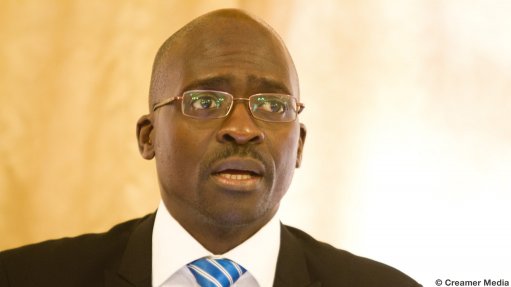
MALUSI GIGABA
DCD Rolling Stock’s recapitalisation programme would be rolled out over three to five years, beginning with the R100-million investment in Phase 1
Photo by: Duane Daws
Johannesburg-based locomotive solutions provider DCD Rolling Stock officially launched Phase 1 of its R240-million recapitalisation programme at its Boksburg manufac- turing facility last month.
The company reaffirmed its commitment to the industrialisation of South Africa’s economy at the ceremony, where Public Enterprises Minister Malusi Gigaba delivered the keynote address.
He said this development underscored the commitment of government to drive industrialisation of the South African economy, which involved the implementation of new and advanced technology to enhance competitiveness.
The recapitalisation programme would be rolled out over three to five years, beginning with the R100-million investment in Phase 1, which saw the regaining and upgrading of DCD’s 42 000 m2 manufacturing facility and equipment.
DCD Rolling Stock GM Petrus Mulaudzi revealed at the launch that the DCD group invested R80-million to regain the facility from its sister company DCD Protected Mobility, which had since moved to a new purpose-built manufacturing plant in Isando.
“An additional R10-million was spent on the installation of four robotic welding cells in October, while the balance was spent on repairs. The recapitalisation programme is essential in promoting internal skills development and growth within DCD Rolling Stock.
“Despite years of downturn, the railway industry in South Africa and the rest of the continent looks set to rapidly expand. It is, therefore, important for DCD Rolling Stock to proactively prepare for this by investing in our people and infrastructure,” he stated.
Gigaba applauded DCD’s investment and stated that it would support the transport sector, especially rail, which played a critical part in the country’s economy.
He added that the investment would also support road to rail migration and provide the much-needed support for localisation.
Further, he noted that government required a better understanding of businesses, and that better relations between the State and businesses needed to be forged to reduce the “trust deficit”.
“If the State does not have the capability to grow the economy by itself, it needs to forge relationships with the private sector,” said Gigaba.
The recent publishing by the South African Reserve Bank of the country’s gross domestic product growth increase of 0.7% in the third quarter in 2013, was disconcerting and reflected negative growth, he said.
“We need high rates of economic growth over a sustained period of time. We have natural resources but we need to make a turn to the unnatural sector, which requires us to invest in and take deliberate decisions and policies to nurture the sector and harvest it for the betterment of the economy,” Gigaba said.
Further, he noted that, the high level of unemployment was unsustainable and high-quality jobs were needed in the manufacturing sector, adding that governments across the world were providing support for the continued development of their respective manufacturing sectors and those types of investments would bolster manufac- turing capabilities.
However, Gigaba believed that DCD’s programme launch was a turning point in the local manufacturing sector as it created “decent work and reduced inequality”.
According to Mulaudzi, the programme would create 100 new jobs in January.
“There are a lot of possibilities created by the decision taken to recapitalise the business and dedicate it to rail. Our objective is to support job creation and the industrialisation of the economy. The programme is a platform for government’s call for localisation. We believe in the localisation drive and are committed to the future of rail in South Africa and Africa,” he said.
Meanwhile, DCD Group MD Rob King noted that South African manu- facturing had lagged, as the industry’s specifications were not up to international standards.
“South African manufacturing, from a DCD perspective, can be internationally competitive. In new sectors, we are capable of producing internationally competitive prices. Soon we will achieve international recognition,” he stated.